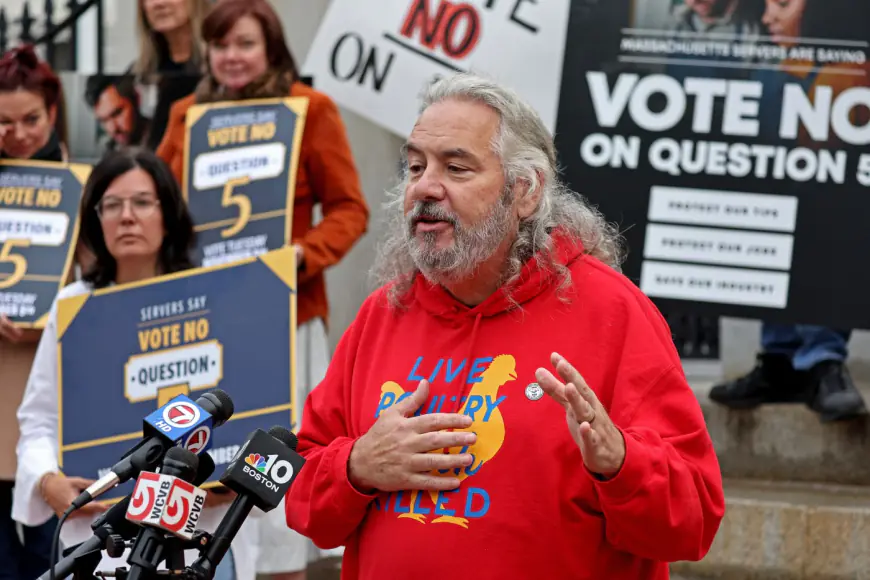Massachusetts Question 5 last call: Ballot initiative casts worry in Greater Boston restaurants
An “overwhelming” amount of restaurateurs, bartenders and servers are making their last call ahead of Election Day, advocating for the general public to fully consider the ramifications of Question 5.

An “overwhelming” amount of restaurateurs, bartenders and servers are making their last call ahead of Election Day, advocating for the general public to fully consider the ramifications of Question 5.
If approved on Tuesday, the wage for tipped employees would gradually increase until it meets the state minimum wage of $15 an hour in 2029. Employers would decide whether their employees must participate in a tip pool, meaning tips could be distributed to non-service staffers.
If the ballot initiative fails, the minimum wage for tipped employees would remain at $6.75.
Throngs of workers in the Massachusetts restaurant industry argue raising hourly pay to $15 would devastate business operations and their livelihoods.
“No one can survive on minimum wage. That’s the truth,” said Demetri Tsolakis, owner of Xenia Greek Hospitality in Boston. “Our servers, bartenders, dishwashers and staff in general are making way over minimum wage. They are scared that if this passes they will see a significant impact: Burnt out, working more, replaced by QR codes.”
Tsolakis, vice president of Massachusetts Restaurants United, spoke with the Herald after a “Vote No on 5” rally in front of the State House on Wednesday. He believes only those in the industry should be voting on the initiative. He hasn’t found any restaurant in favor of change.
One man walking past the State House yelled at those gathered for the standout: “You’re being tricked by the rich. You’re being fooled by the rich.”
Just an hour after the rally ended, Gov. Maura Healey and Lt. Gov. Kim Driscoll released a statement that echoed their support from earlier this month.
“As former waitresses who know what it’s like to rely on tips, we know how hard our servers work and believe they deserve to be well-compensated for all they do,” the statement said. “It’s why we are joining with servers across the state in opposing Question 5 because we believe it will lower their compensation, not raise it.”
National advocacy group One Fair Wage brought the measure to the ballot after garnering enough support last spring, clearing the threshold only by 136 signatures.
Backers say the subminimum wage for tipped workers “has its origins as a direct legacy of slavery” and has led to restaurant workers “facing the highest rates of sexual harassment of any industry.”
Tipped workers in states without a subminimum wage earn 10–20% more than those in states with a lower-trier wage system, like Massachusetts, the Political Economy Research Institute at UMass Amherst found in a report earlier this month.
Restaurants also face “only modest cost increases” of about 2%, the study found.
California, one of the seven states with a One Fair Wage policy, was found to tip at the highest rate in the nation, averaging 22.69%, according to a USA TODAY study last fall. Minnesota, Montana, Nevada, Alaska, Washington, and Oregon also have implemented it.
Implementation doesn’t guarantee success.
“After Washington, D.C. began phasing out a tip credit, hundreds of restaurant owners were forced to impose a mandatory service charge on customer checks to account for rising costs,” according to a Carnegie Mellon report released last February.
One Fair Wage in Massachusetts won’t solve the problems that restaurants face today, said Joe McGuirk, a bartender at Highland Kitchen in Somerville.
McGurik admitted wage theft, harassment, discrimination and sexual assault are issues, but the roots of those problems, he said, need to be addressed for real change: housing, high healthcare costs, and the wealth gap between blue- and white-collared workers.
“We have to do better for our workers on those issues,” he said, “but this bill is not going to solve that In fact, we believe this bill will hurt the places that I’ve been fortunate enough to work at … the places that define our neighborhoods.”

What's Your Reaction?









































































































